Animal Shelters Across State Seeing Big Hike in Pet Surrenders
'Unprecedented...at a crisis level.' Why? Owners can't afford their pets.
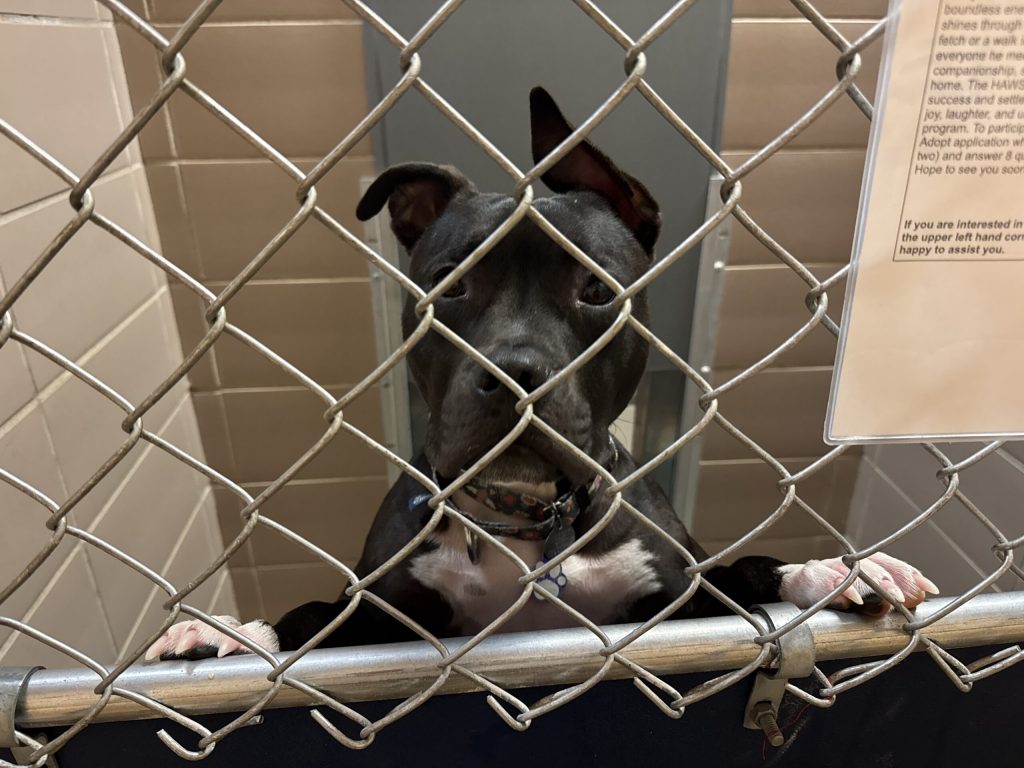
A dog up for adoption at Humane Animal Welfare Society of Waukesha County is seen here on Wednesday, July 23, 2025. Evan Casey/WPR
On Monday, workers with Woof Gang Rescue took in a German Shepherd and her three babies. The dogs had been surrendered, or given up, by their owners.
“They can’t afford them,” said Jodie Hoffmann-Ruffalo, the founder and director of Woof Gang Rescue.
Hoffmann-Ruffalo said it’s an “unfortunate” story that’s become all too common recently. Animal shelters across Wisconsin have experienced a recent uptick in people giving up, or surrendering, their pets. It’s a trend that’s leading to shelter and rescue workers putting in long hours to try and find new homes for our furry friends.
“That’s all we can do,” she said about taking the dogs in the shelter. “I mean, we try to help the community as much as possible.”
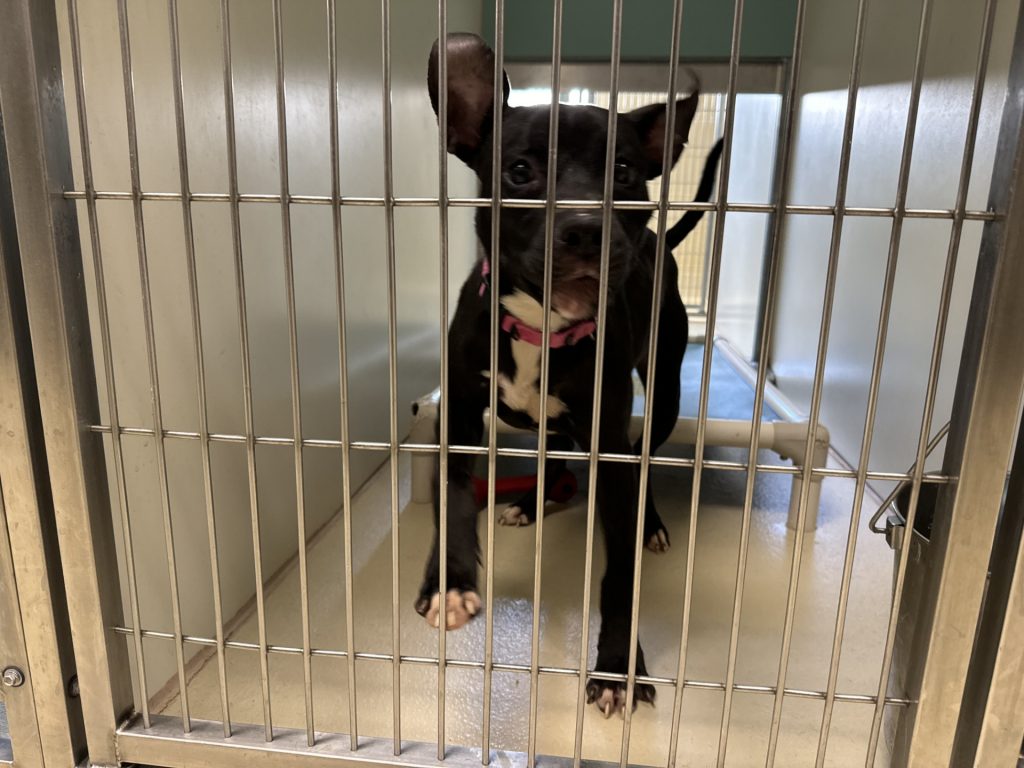
A dog jumps while in a kennel at the Milwaukee Area Domestic Animal Control Commission shelter. Evan Casey/WPR
The Wisconsin Humane Society operates shelters in Milwaukee, Ozaukee, Brown, Door, Kenosha and Racine counties. So far this year, the nonprofit has experienced a 23 percent increase in pets being surrendered at its six Wisconsin shelters.
1,108 pets were surrendered to the Wisconsin Humane Society in June alone, according to data shared with WPR. That’s more than twice as many as in the same month last year, when 539 pets were surrendered.
“We are just struggling to keep up with that intake,” Speed said.
The Washington County Humane Society is experiencing a 16 percent increase in pet surrenders so far this year compared to last year. Joe Poczkalski, a spokesperson for the shelter, said they most commonly get surrenders due to financial constraints, changes in housing or even “lack of time for the pet.”
From July 1, 2024 to June 30, 2025, the Humane Animal Welfare Society of Waukesha County saw a 13 percent increase in dogs and 20 percent increase in cats coming through their doors compared to the same timeframe one year prior.
“People are finding that they can’t afford the care that their pets need, and without programs to support them, they end up surrendering,” said Jennifer Smieja, a spokesperson for the shelter.
The Humane Animal Welfare Society of Waukesha County saw more than 1,800 dogs and puppies come to the shelter during the fiscal year 2025, while nearly 2,700 cats and kittens came into the shelter. That number includes pets that were surrendered, stray animals or transfers from other shelters.
The Milwaukee Area Domestic Animal Control Commission, which takes in abandoned, lost or unwanted animals in Milwaukee County, is also struggling to keep up with an increase in need. A recent social media post from the organization said in April, around 11 dogs were adopted or reclaimed by owners every day, while they took in around 18 dogs per day during that month.
“We never turn away a stray animal from Milwaukee County — but there are only so many ways to accommodate more animals,” the post said. “The more animals there are, the more stressful it is for both them and staff. Kennels are being halved while even more dogs are coming into the building than are going out each day.”
Wisconsin is not alone in dealing with the issue. Animal shelters across the nation — including in New York, Los Angeles and Chicago — are also seeing increases in pets being surrendered.
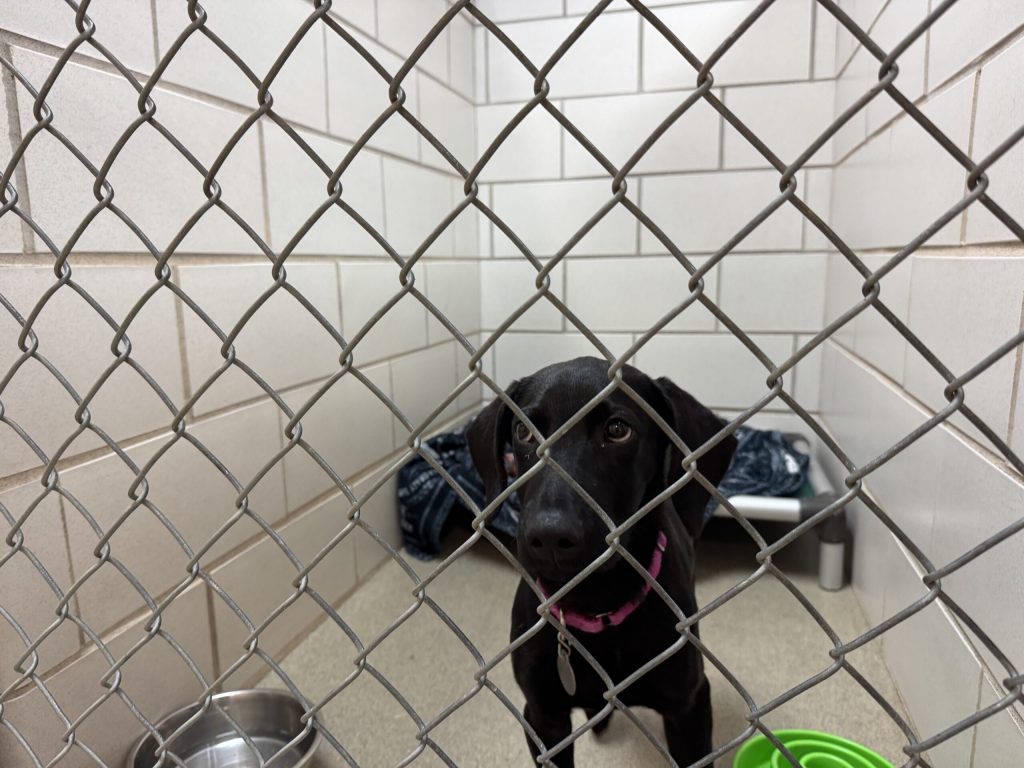
A dog up for adoption at Humane Animal Welfare Society of Waukesha County sits in a kennel. Evan Casey/WPR
Why is this happening?
Shelter operators and rescue workers in Wisconsin cited financial constraints and the high cost of veterinarian care as some of the main reasons for the recent increase in surrendered pets.
Last year at this time, the Wisconsin Humane Society had a pet surrender intake of 4,043. So far this year, that number has increased to 4,990 pets.
“The number one reason that people bring animals to us is ultimately financial,” Speed said. “Either there’s struggles with accessing affordable vet care, pet supplies, pet food, affordable housing and we are seeing the need for some of our public services just absolutely skyrocket.”
A 2025 report from the Bank of America Institute found that the cost of pet services, including veterinarian bills and pet grooming, has risen by 42 percent since 2019. The price of pet food and treats is also up 22 percent since 2019, according to the report.
Hoffmann-Ruffalo said a few years ago, a quick visit to the veterinarian’s office might have only cost around $20 or $30.
“Now you’re looking at anywhere from $70 to $90 just for an office visit,” Hoffmann-Ruffalo said. “Who can afford that?”
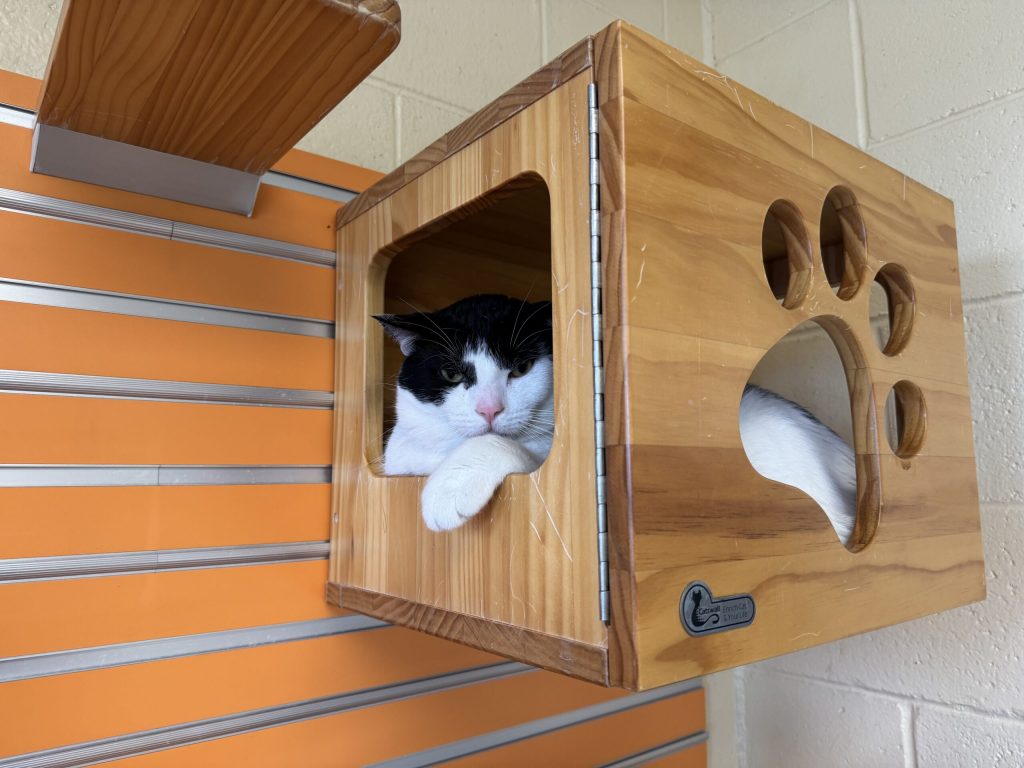
A cat up for adoption at the Humane Animal Welfare Society of Waukesha County is seen here on Wednesday, July 23, 2025. Evan Casey/WPR
Data from American Veterinary Medical Foundation and VetSource found that veterinary clinics have seen a 3.1 percent decrease in visits this year compared to last year.
Hoffmann-Ruffalo said increased veterinarian care service costs also include the cost to spay or neuter pets.
Liz Friedenfels, the director for the Lincoln County Humane Society, said many pet owners are struggling to pay for medical expenses and they may not want to give up their pet.
“But there’s so many things going on that they just can’t afford the surgeries or the maintenance that this animal requires,” Friedenfels said.
Friedenfels said having a pet can also limit someone’s housing options, as many landlords have pet fees or don’t allow pets in a housing unit.
“So we see a lot of people having to bring in animals because they aren’t able to find a place, or can’t afford the fees to keep the animal in the home,” Friedenfels said.
Speed also said a lack of affordable housing, especially housing that allows dogs or cats, is an issue they often hear when people are forced to surrender their pets.
“If you’re looking for an apartment, it is so hard to find right now, let alone an apartment that allows a 50-pound dog,” Speed said.
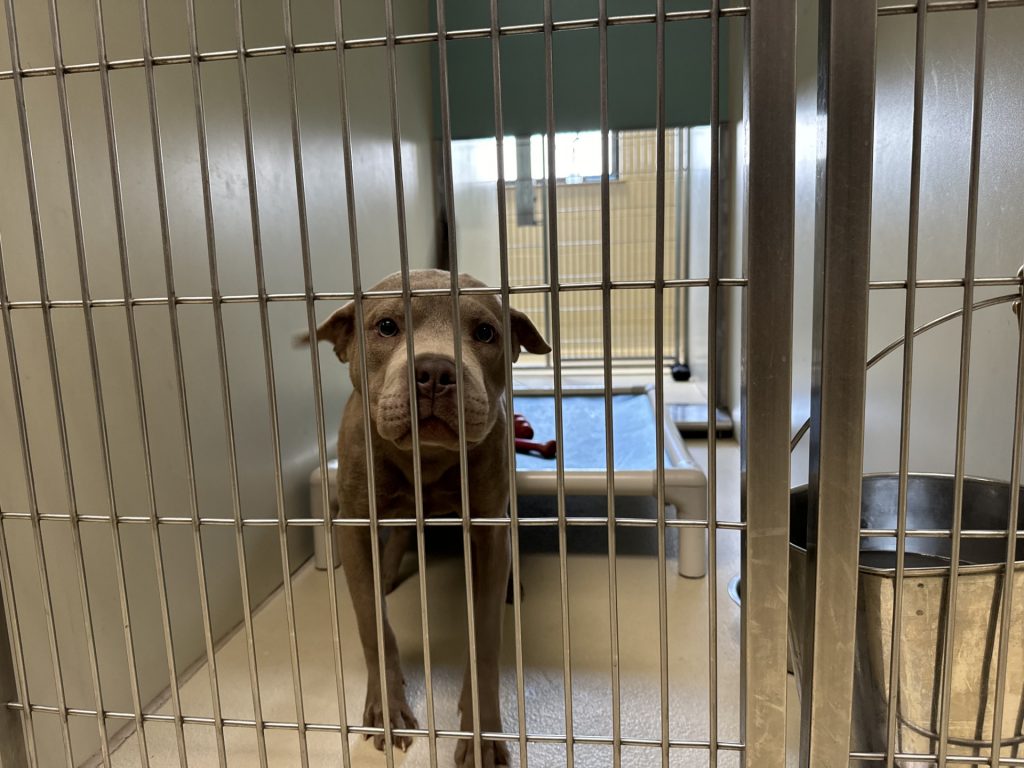
A dog waits to be taken home while at the Milwaukee Area Domestic Animal Control Commission on Thursday, May 22, 2024. Evan Casey/WPR
Shelter workers and volunteers are working around the clock to keep pace with the uptick.
“It is back-breaking work caring for this many animals, and this is true of shelters across Wisconsin,” Speed said.
Around 10 percent of the animal population at the the Wisconsin Humane Society used to be from transfers from animal shelters in the southern United States. Speed said they’ve had to halt those transfers.
“Because of our high population, now we’ve had to postpone and cancel transfers in order to make room for the influx of local animals,” Speed said.
A May 2021 survey from the American Society for the Prevention of Cruelty to Animals found that nearly 1 in 5 homes adopted a cat or dog during the start of the COVID-19 pandemic.
“During COVID we had such an uptick in adoptions, and people were really getting on board with adopting,” Smieja said.
But in recent years, Smieja said the length of stay for an animal at their shelter has increased from around two weeks to three weeks now. That could be because people can’t afford to care for a pet now, Smieja said.
One way to help? Foster a pet.
“We have been making huge pleas to the community to consider fostering,” Speed said. “Even if you can’t adopt, many people can foster an animal, if that’s just for a few days or a couple weeks.”
Wisconsin animal shelters experiencing an ‘unprecedented’ number of pet surrenders was originally published by Wisconsin Public Radio.
If you think stories like this are important, become a member of Urban Milwaukee and help support real, independent journalism. Plus you get some cool added benefits.




















